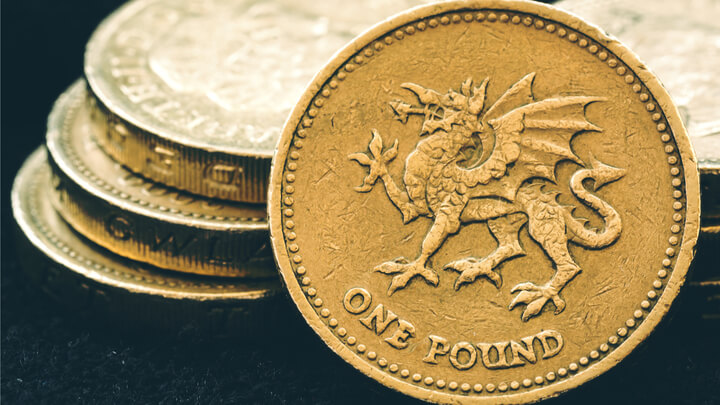
Money in the United Kingdom: Banks, ATMs, cards & currency exchange
The UK is a capital of global finance. Read this for a quick overview of British currency, financial institutions, and spending basics in the UK.
Currency in the UK
The official currency of the UK is the Pound Sterling.
While the pound is officially UK’s currency, some businesses do also accept euros in the hope of attracting tourists. In general though, it’s best to use pounds. Other currencies aren’t widely-accepted, so you can’t count on the ability to spend them.
Characteristics of the British Pound Sterling (GBP)
| Names & nicknames | Sterling, Pound Sterling, Pound (or quid) & Pence |
|---|---|
| Symbols & abbreviations | GBP, £ (pound), p (pence) |
| 1 GBP | There are 100 pence in one pound. |
| GBP coins | Pence come in denominations of 1p, 2p, 5p, 10p, 20p, 50p, and £1 and £2. All of them are frequently seen in circulation. |
| GBP banknotes | Notes come in denominations of £5, £10, £20, and £50. |
Exchanging currency in the UK
The UK is well-placed globally as a financial and tourist capital. Whilst there, you'll probably find the financial infrastructure to accommodate your needs.
When in doubt, use an ATM, which will charge you the interbank or mid-market exchange rate. This rate is the midpoint between the buy rate and the sell rate in global currency markets. You can rely on it being the ‘fairest’ rate.
Apart from an ATM, you’ll find currency exchange desks in airports, hotels, and in storefronts in larger British cities. These desks tend to mark up the exchange rate and charge hidden fees. You also run the risk of them refusing any torn or damaged bills. So in general, exchange desks aren’t your best option in the UK, especially since ATMs are prevalent.
To prepare in advance for your time in the UK, your home bank can probably exchange your currency into sterling. The rates will be similar to the ones you'll find once you arrive in the UK. If you need further exchange services, aim to find a British bank that partners with your home bank. Partner banks can waive foreign transaction fees and withdrawal fees at ATMs.
Using traveller's cheques in the UK
Traveller’s cheques aren't widely-accepted in the UK. They're seen as an inconvenient method of currency exchange, and many banks won’t bother to offer cheque processing. They don’t actually offer good exchange rates, either. If you feel unsafe using foreign ATMs, talk to your bank about a pre-paid debit card. Just don’t waste time finding a place to cash traveller’s cheques.
Using credit cards and debit cards in the UK
All major credit and debit providers are accepted across the UK, especially Visa and MasterCard. American Express and Diners Club may not be accepted in all restaurants, bars, cafes, and shops. In general though,, you'll be able to use your card in most places.
Check with your bank or card company before you travel to ask them about using your card in a foreign country. If you have a non-UK card, you'll most likely pay a charge for foreign transactions. Sometimes it will make sense to use one card over the other. Also, tell your card issuer that you’re going abroad so they don’t freeze your account for potential fraud.
In the UK, always choose to be charged in pounds sterling, and not in your home currency. Otherwise, you give the ATM control over your exchange rate, and they might charge you unfairly. This is called ‘Dynamic Currency Conversion’, and it usually means you'll pay extraneous fees.
Small off-licensed cafes and restaurants might very well be cash-only, so it’s good to have cash on you. However, many places opt for chip-and-pin cards or event contactless technology over cash. Of all payments made in the UK, only about half are cash transactions. Even buses no longer accept cash in many cities. So if you want to be cash-free, you’re in the right place.
ATMs in the UK
ATMs are common throughout the UK; there are more than 70,000 across the country. However, ATM fraud can be prevalent in large cities, so always make sure to cover your pin code when you enter it, and be aware of your surroundings.
ATMs connected to post offices will not charge you withdrawal fees. You can also use an ATM locator to find your bank. Click to find the locators for MasterCard (CIRRUS), American Express, Maestro and Visa (PLUS). You'll find many ATMs, no matter your bank.
Banks in the UK
If you bank with a global bank, you’ll find a branch in the UK.
Major Retail Banks in the UK
International Banks Operating in the UK
Alternatively, for simple access to the money you need while you’re abroad - and an even better deal - use Wise.
If you have a bank account in the UK, or know someone who does, you can transfer money between bank accounts using the real mid-market exchange rate. It's a convenient way to get your cash, with no hidden fees.
*Please see terms of use and product availability for your region or visit Wise fees and pricing for the most up to date pricing and fee information.
This publication is provided for general information purposes and does not constitute legal, tax or other professional advice from Wise Payments Limited or its subsidiaries and its affiliates, and it is not intended as a substitute for obtaining advice from a financial advisor or any other professional.
We make no representations, warranties or guarantees, whether expressed or implied, that the content in the publication is accurate, complete or up to date.